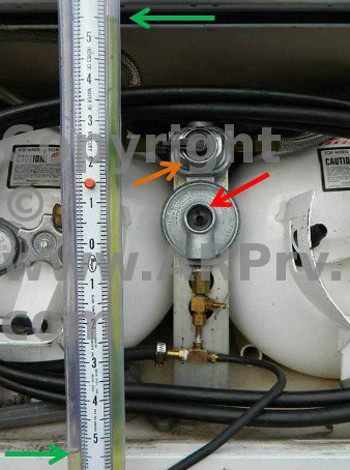
REGULATOR PRESSURE TEST
This figure shows a typical RV with a dual tank automatic switching regulator. Please note that on this RV,
there is a port for checking the regulator pressure output. A ‘u-tube’ water manometer is connected to the test
port, and the manometer is showing 11 inches of water column (WC). Note that there is a zero on the inch
measurement gauge that measures the green water in the manometer. With the LP valve off, one zeros the gage
by aligning the zero with the water level before turning on the propane tank valve.
When the LP gas valve turns on, the side of the ‘u-tube’ that is connected to the pressure port, the water
goes down by 5.5 inches, and the side open to the atmosphere goes up by 5.5”. The green arrows point this out,
this is a total of 11” WC gas pressure.
REGULATOR FLOW TEST
Now that it is established that the pressure is correct, have someone turn on a burner on the stove,
or the LP heater. Keep an eye on the pressure, it will jump and stabilize. As a rule of thumb,
the pressure should not drop more than about ½” WC once the pressure stabilize.
Please see below: NFPA 1192 Standard on Recreational Vehicles 2021, section 5.3.20.6 Pressure Drop Test
REGULATOR ADJUSTMENT
To adjust pressure, most regulators have a cap that covers the pressure adjusting screw; this is located
just above the diaphragm red arrow. Remove the cap and turn the screw ½ turn at a time,
counting the turns for reference. The reason the adjustment is there - to correct for drift in the regulator over time,
this is normal. If one has to turn the adjustment screw say 10 full turns to get your pressure set, the regulator may be failing?
HOW DO I TEST REGULATOR FOR FAILING?
In addition to the comments above, the regulator can leak from the diaphragm. If you smell propane, turn off your gas
and perform a bubble test immediately to find the leak. The propane regulator diaphragm always has a hole that vents
the diaphragm; again this is where the red arrow is in the photo above. Find that hole, and one can put their finger
over the hole and put a mixture of 50/50 water dish soap. If you see growing bubbles, the regulator needs to be
replaced.
HOW DO I TEST FOR LEAK IN PROPANE SYSTEM?
The test that is require at the factor by the NFPA 1192 Standard on Recreational Vehicles 2021,
section 5.3.20.6 Pressure Drop Test, is summarized as follows:
Pressure Test:
Pressure of not less than 8 inches water column or more than 14 inches of water column shall be used to test the system.
Leak Down Test:
After confirming above that the system pressure regulator is operational,
turn off the propane at the tank.
Carefully vent some pressure at the stove top so that the manometer reads 8 inches of water column.
The system shall hold pressure for at least a 3-minute period with out any drop in pressure.
If pressure drop is observed, the system failed the pressure leakage drop test.
